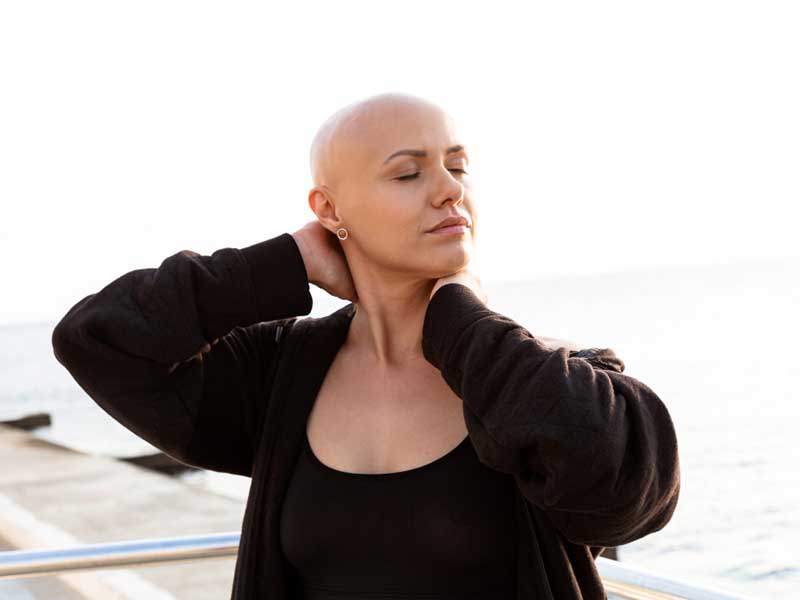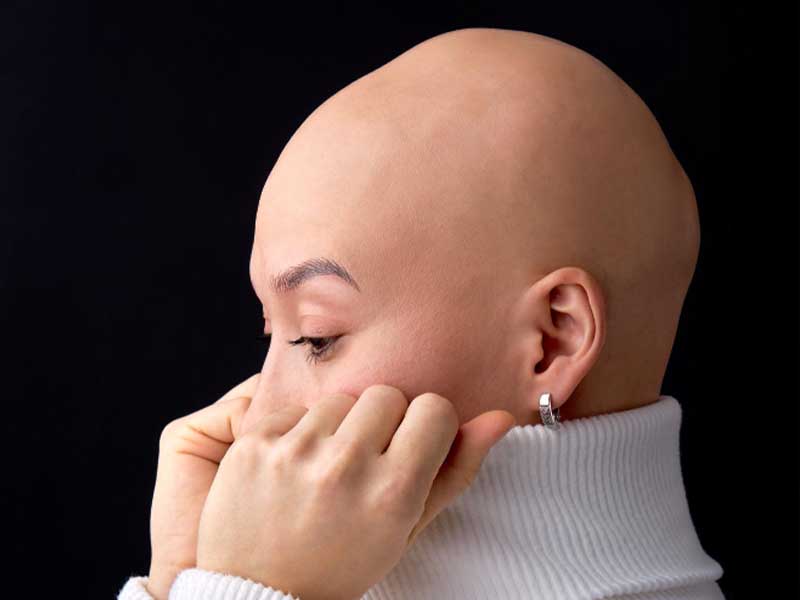Anagen effluvium is a type of hair loss that occurs when hair follicles stop growing hair during the anagen phase. It is a condition that can be caused by chemotherapy, radiation therapy, and other medications. Rapid hair loss is a hallmark symptom of this condition, and it can occur on the scalp and other parts of the body. There are various treatments and tips that can promote hair growth and reduce the effects of anagen effluvium. In this article, we will discuss the causes, symptoms, and treatments of anagen effluvium, along with tips to promote healthy hair growth.
What is Anagen Effluvium?
Anagen effluvium is a type of hair loss that occurs when hair follicles stop growing hair during the anagen phase. This can be caused by a variety of factors, including chemotherapy, radiation therapy, and other medications. Anagen effluvium is characterized by rapid hair loss and can be a distressing experience for those affected. However, there are several treatments and tips that can help promote hair growth and reduce the effects of anagen effluvium.

Symptoms of Anagen Effluvium
The symptoms of anagen effluvium can vary depending on the cause and severity of the condition. Here are some common symptoms that are associated with anagen effluvium:
- Sudden and rapid hair loss: This is the most common symptom of anagen effluvium. Hair loss can occur on the scalp, as well as other parts of the body, such as the eyebrows, eyelashes, and pubic area. The hair loss is usually sudden and rapid, occurring within a few days or weeks. Discover the Sign & Symptoms, Etiology, and Treatment Options for hair loss.
- Scalp tenderness: People with anagen effluvium may experience scalp tenderness. This can make it painful to touch the scalp or comb the hair.
- Itching: Anagen effluvium can cause itching of the scalp. The itching can be mild or severe and can be accompanied by flaking or dandruff.
- Burning sensation: Some people with anagen effluvium may experience a burning sensation on the scalp. Redness or inflammation may accompany this.
- Other symptoms: Depending on the cause of anagen effluvium, other symptoms may be present. For example, if anagen effluvium is caused by chemotherapy, other symptoms such as nausea, vomiting, and fatigue may be present.

Causes of Anagen Effluvium
Anagen effluvium is a type of hair loss that can be caused by various factors, such as medications and medical conditions. Some of the most common causes of anagen effluvium include:
- Chemotherapy: Chemotherapy drugs target rapidly dividing cancer cells, but they can also affect other rapidly dividing cells in the body, including hair follicles. This can lead to hair loss on the scalp and other parts of the body.
- Radiation therapy: Radiation therapy can also damage hair follicles and cause hair loss, similar to chemotherapy.
- Medications: Certain medications, such as anticoagulants, antidepressants, and immunosuppressants, can also cause anagen effluvium as a side effect. This is because these medications can disrupt the normal hair growth cycle and cause hair to enter the resting phase prematurely.
- Medical conditions: In some cases, anagen effluvium may be caused by an underlying medical condition, such as alopecia areata, lupus, or thyroid disorders. These conditions can disrupt the normal hair growth cycle and lead to hair loss.

It’s important to note that anagen effluvium is a temporary form of hair loss and usually resolves on its own once the underlying cause is addressed. In the case of chemotherapy-induced anagen effluvium, hair typically regrows within 3 to 6 months after treatment ends. However, if anagen effluvium is caused by an underlying medical condition, treatment of the underlying condition may be necessary to prevent further hair loss.
Anagen Effluvium Treatment
Anagen effluvium treatment is determined by the underlying cause and severity of the condition. In some cases, hair may regrow on its own once the underlying cause is treated or removed. However, there are several treatments and tips that can help promote hair growth and reduce the effects of anagen effluvium.
1. Minoxidil
Minoxidil is a topically applied hair loss treatment. It increases blood flow to the hair follicles, which promotes hair growth. Minoxidil is an over-the-counter medication that can be applied directly to the scalp. It is generally safe and well-tolerated, but it may take several months to see results.
2. Scalp Massage
Scalp massage can help increase blood flow to the hair follicles and promote hair growth. It can also help to reduce stress, which can contribute to hair loss. To perform a scalp massage, use your fingertips to gently massage your scalp in circular motions for a few minutes each day.
3. Hair Supplements
Hair supplements, such as biotin, vitamin D, and iron, can aid in the growth of healthy hair. These supplements can be taken orally and are available over the counter. However, before taking any supplements, consult with your doctor because they may interact with other medications or medical conditions.

4. Hair Transplant Surgery
In severe cases of anagen effluvium, hair transplant surgery may be an option. This involves removing hair follicles from one part of the body and transplanting them to the scalp. Hair transplant surgery can be expensive and may require multiple procedures.
5. Wigs or Hairpieces
Wigs or hairpieces can be a temporary solution to hair loss caused by anagen effluvium. They are available in a variety of styles and colors and can be custom-made to fit your head. Wigs and hairpieces can be made from synthetic or human hair and can be a natural-looking solution to hair loss.
Anagen Effluvium Prevention
While it may not be possible to completely prevent anagen effluvium in certain situations, there are some steps that individuals can take to minimize the risk of developing this condition. Here are some ways to prevent anagen effluvium:
- Use gentle hair care products: Avoid using harsh shampoos, conditioners, and other hair care products that can damage hair follicles and contribute to hair loss. Use gentle, sulfate-free products that are designed to nourish and strengthen hair.
- Be gentle when styling hair: Avoid using heat styling tools such as straighteners, curling irons, and hair dryers, which can damage hair and cause breakage. Instead, air dry hair or use a diffuser attachment on a low heat setting. Avoid tight hairstyles such as braids, ponytails, and buns, which can put tension on the hair and lead to hair loss.
- Protect hair from the sun: Sun exposure can damage hair and lead to hair loss. Wear a hat or scarf to protect hair from the sun’s harmful rays when spending time outdoors.
- Eat a healthy diet: A healthy diet rich in vitamins and minerals can help promote hair growth and prevent hair loss. Incorporate foods such as leafy greens, nuts, and fish that are rich in vitamins and minerals such as iron, zinc, and biotin.
- Avoid smoking: Smoking can damage hair follicles and contribute to hair loss. Quit smoking to promote healthy hair growth.
- Talk to your doctor: If you are undergoing chemotherapy or radiation therapy, talk to your doctor about potential side effects and ways to minimize the risk of hair loss. Your doctor may be able to recommend a scalp cooling cap or other treatments to help prevent hair loss during treatment.

In conclusion, anagen effluvium can be a distressing condition that can cause sudden and rapid hair loss. While it may not be possible to prevent anagen effluvium in all cases, individuals can take steps to minimize the risk of developing this condition. By taking care of your hair and overall health, you can help promote healthy hair growth and prevent hair loss.
Tips to Promote Hair Growth
Here are some additional tips that can help promote hair growth and reduce the effects of anagen effluvium:
1. Maintain a Healthy Diet
Eating a healthy diet can help promote healthy hair growth. Make sure to include foods that are rich in vitamins and minerals, such as fruits, vegetables, lean proteins, and whole grains. Drinking plenty of water can also help keep your hair and scalp hydrated.
2. Avoid Heat Styling and Chemical Treatments
Heat styling and chemical treatments, such as perms and relaxers, can damage hair follicles and lead to hair loss. If possible, avoid these types of treatments and use heat styling tools, such as flat irons and curling irons, sparingly.
3. Protect Your Hair from the Sun and Wind
Exposure to the sun and wind can damage hair and lead to hair loss. If you spend time outdoors, wear a hat or scarf to protect your hair from the elements.
4. Practice Stress-Reduction Techniques
Stress can also contribute to hair loss. Practicing stress-reduction techniques, such as yoga, meditation, or deep breathing, can help reduce stress and promote healthy hair growth.
5. Use Gentle Hair Care Products
Using gentle hair care products, such as sulfate-free shampoos and conditioners, can help prevent further damage to hair follicles. Avoid using products that contain harsh chemicals or fragrances, as these can irritate the scalp and lead to hair loss.
6. Get Enough Sleep
Getting enough sleep is important for overall health and can also promote healthy hair growth. Aim to get 7-8 hours of sleep each night to help reduce stress and promote healthy hair growth.
Final Thoughts
In conclusion, anagen effluvium can be a distressing experience for those affected. Rapid hair loss, scalp tenderness, itching, and a burning sensation are some common symptoms of this condition. Anagen effluvium is a temporary form of hair loss that usually resolves on its own once the underlying cause is addressed. Various treatments and tips can help promote hair growth and reduce the effects of anagen effluvium, such as minoxidil, scalp massage, hair supplements, and hair transplant surgery in severe cases.

You can also benefit from Remotederm Online dermatology consultation services, which offer access to dermatologists even from remote locations, ensuring timely diagnosis and treatment for anagen effluvium and other skin conditions. Overall, early diagnosis and prompt treatment of anagen effluvium can help prevent further hair loss and promote healthy hair growth.
FAQs
1. What is the anagen phase of hair growth?
The anagen phase is the active growth phase of the hair growth cycle, during which the hair follicle produces new hair. This stage may last anywhere from two to six years.
2. Can anagen effluvium be prevented?
Anagen effluvium cannot always be prevented, especially if it is caused by a medical treatment such as chemotherapy. However, maintaining a healthy lifestyle and avoiding certain medications may help reduce the risk of anagen effluvium.
3. How effective is hair transplant surgery for anagen effluvium?
Hair transplant surgery can be an effective treatment for anagen effluvium, particularly if the condition is caused by genetic factors. However, it is important to speak with a qualified hair restoration surgeon to determine if you are a good candidate for the procedure.
4. Are hair supplements effective for treating anagen effluvium?
Hair supplements may be helpful for promoting hair growth and reducing the effects of anagen effluvium, particularly if the supplements contain vitamins and minerals that are important for healthy hair growth. However, before taking any supplements, consult with a healthcare professional.
5. Can scalp massage help with anagen effluvium?
Scalp massage can be a helpful treatment for anagen effluvium, as it can increase blood flow to the hair follicles and promote hair growth. However, it is important to use gentle, circular motions when massaging the scalp to avoid further hair loss.
